#American genocide
Text
For everyone who keeps saying “wHaT aBoUt ThE hOsTaGeS?!?! ReLeAsE tHe HoStAgEs!!1!”
#israeli genocide#free palestine#palestine#israeli apartheid#anti imperialism#gaza#apartheid#israel#death to israel#American genocide#US genocide#USAmerican genocide#hostages#tel aviv#Jerusalem#Rafah
8K notes
·
View notes
Link
The true history of Mount Rushmore is appalling. In a nation that is awash in the blood of innocent humans who were murdered by colonizers, that refuses to reckon with its white supremacist history, Mount Rushmore stands out as a glaring example of the cruelty and violence of America’s brutality.
“The Lakota considered the carving of the four presidents' faces on what was once Six Grandfathers, a defacement of their sacred site, especially as "those four people had a lot to do with destroying our people's land base," Douville said. Indeed, Washington waged war against Native American tribes, Jefferson was considered the architect of policies that would result in the removal of Native Americans from their lands, Lincoln ordered the execution of 38 Dakota Native American rebels, the largest mass execution in American history, and Roosevelt systematically removed Native Americans from their lands.”
“We found the monument had a dark history of ties to the KKK, an illegal war, and the violent suppression of the Native American Lakota (also known as Sioux) people. We looked at each claim in the meme, starting with the history of the region before Mount Rushmore was built, followed by an investigation into its creation and alleged KKK funding.“
If you don’t know the truth about this monument to hate and genocide, please look into it, and encourage others to do the same.
#george floyd protests#mount rushmore#american history#white supremecy#american genocide#native american
948 notes
·
View notes
Text
My Sins Return to Visit Me: Atrocities, Whiteness, and Cosmic Justice in The Patriot
As he watches over the body of his slain son just before The Patriot's final battle, Benjamin Martin confides to his friend, Harry Burwell, that he believes Gabriel's death is some kind of divine repayment for his past wrongs: "I have long feared that my sins would return to visit me, and the cost is more than I can bear." This line also appears at the very beginning of the film, replacing scenes that were filmed but not included in any released edition featuring Martin's actions at Fort Wilderness during the French and Indian War years prior. We hear it in a voice over as Martin closes the trunk lid on his Cherokee tomahawk. Not only is he haunted by his past, but this representation of the American Revolution is haunted by the Cherokee people in spite of writer Rob Rodat and director Rolad Emmerich's attempts to erase them. Although the narrative brushes Martin's words here off as simple grief, I would argue that this reading of his past is more historically honest than the one the film's ending suggests.
In a broad sense, this film appropriates Native identity for the Patriots in the same way Benjamin Martin appropriated that tomahawk. In The Patriot's logic, these men defeated the British because they were fighting to protect their homes and families, they knew the terrain well from a lifetime spent living on it, and they made use of guerilla tactics to gain an advantage over stronger forces. Meanwhile, the British, personified by Colonel Tavington, are brutal colonizers motivated only by greed. It is not hard to see how including Native characters would trouble this interpretation. Only one scene in the film features any, scouts who drop off the single survivor of Benjamin Martin's massacre in the woods at Colonel Tavington's camp. Apart from this, the only onscreen representation the Cherokees have is Martin's tomahawk, and the film only tells their story through the lens of his memories.
Ironically, presenting the Patriots as "native" ends up meaning Tavington's treatment of them bears striking resemblance to historical Patriots' treatment of the Cherokees and other tribes. It is unclear how many homes Tavington has targeted in the beginning of his screentime to have earned the nickname "the Butcher" that General O'Hara informs us about, but after Cornwallis allows him to resume these tactics, he burns eight Patriot homes, killing the inhabitants before burning Pembroke Church with its congregation inside. A few years prior from 1776-1777, a period the film skips over, Patriot forces had waged war against the Cherokee nation for its support of the British crown with devastating effects. Historian Jordan Baker writes in "The Cherokee-American War from the Cherokee Perspective:"
"All along the border, American troops launched a scorched earth campaign. And with each victory the Continental forces earned, they burned Cherokee towns and took survivors prisoner. By the end of the campaign, they had destroyed over fifty Cherokee towns, including crops and livestock, and killed hundreds of Cherokee, enslaving the survivors and sending them as far off as the Caribbean."
Among Tavington's first lines in the film are orders surely similar to those Continental officers gave in the aforementioned Cherokee towns: "Fire the house and barns. Let it be known that if you harbor the enemy, you will lose your home." Even the worst excesses of Tavington's cruelty have more in common with Americans' treatment of Native peoples after the war than any British actions during it. For example,
"In March 1782, after Indian attacks upon American settlements on the western frontier, militiamen under the command of Col. David Williamson attacked the Moravian Christian Mission at Gnadenhutten. Peaceful Delaware Indians, who had converted to Christianity, were rounded up, and ninety-six Delaware Indians, men, women, and children, were bludgeoned to death."
Perhaps most ironically, Tavington's lust for the Ohio valley is a sentiment that historically belonged to his enemies. According to Jason Edwin Anderson, American land speculators, including George Washington, had designs on this region, but the Royal Proclamation of 1763 recognized Native sovereignty there and barred settlement beyond the Appalachian Mountains. As a result, expansion was a stronger motive for independence than freedom from British tyranny in the western colonies. In almost every case, Tavington's atrocities and the reasons behind them are displaced American ones. Under different circumstances, he would have been a model Patriot.
Reading The Patriot by light of the Native stories it erases makes it less a story of hardy pioneers and their effete oppressors than of one set of brutal colonizers being given a taste of their own medicine by a slightly more recently arrived brutal colonizer. However, there are a couple of crucial and related differences between Tavington's fictional atrocities and the Patriots' historical ones. First, Tavington's reach is far more restricted. General Cornwallis grants him permission to utilize brutal tactics solely in service of capturing Martin. He does not direct his other officers to coordinate with Tavington and kill as many rebels as possible. Why? In Cornwallis's words, "These colonials are our brethren." Not "These colonials will be our brethren after we win the war," which would suggest a political meaning to "brethren." That they are brethren now suggests that this brotherhood is based in something unchangeable, like race.
Even Martin concedes the humanity of British soldiers; he offers Rawlins a bounty for their gear, not their scalps. His disposal of his enemies at Fort Wilderness also evinces a more profound hatred for Native people; he sends a raft full of heads and two men alive "to tell the tale" to the French fort but baskets of eyes, tongues, and fingers to the Cherokees with no one to explain what happened. Tavington holds Whiteness in no such esteem. He murders people of color, too, shooting some Black men for refusing to give him information, but their fate pales in comparison to the one that awaits the White congregation of Pembroke Church for the same reason. What appears to make Tavington's actions so aberrant in this context, and so shocking to the film's heroes even after he does the same things numerous times, is not their brutality or that they are directed against non-combatants, but that he targets other White people.
I can't help wondering how the Cherokees would have reacted to their ally in red and green had they been present in the film to do so. I imagine very different responses. On the one hand, some might have felt apprehension about the Patriot retribution that would follow Tavington's actions stemming from their own memories of Fort Wilderness. Others, also with Fort Wilderness on their minds, may have felt that Tavington had thrown the party of the year at Pembroke Church and rudely failed to invite them. Surely some of the scouts who bring Tavington the survivor are the right age to have received Martin's baskets from Fort Wilderness as children, but they are denied the opportunity for vengeance that Martin so eagerly indulges for himself. That would have been an even more fitting means of Martin's sins returning to visit him, if that was indeed what the filmmakers were aiming for.
Instead, they retreated even further from Cherokee representation than originally intended. The extended cut features a very brief scene in which Captain Bordon informs Tavington that the Cherokee scouts have arrived, and the two officers approach two scouts who stand facing them before the camera cuts away. In the theatrical release, the scene opens on the scouts' backs as they walk through the camp, and the camera cuts to Tavington and Bordon entering the tent where the wounded private is being treated. Apparently even showing Tavington in the same frame with Cherokee men emphasizes too clearly that the British were allied to people many Patriots, Martin obviously included, viewed as subhuman.
If Martin did maintain his view of the loss Tavington visited on him as a kind of cosmic justice, it would make him a far more interesting and reflective character. It would mean he recognized, on some level, that there was a price to pay for his horrific, racially-motivated violence beyond just feeling guilty. Moreover, it would have acknowledged that American imperialism was no less greedy and destructive than British imperialism. If the film supported that reading, Martin might have died along with Tavington, or at the very least lost his ill-gotten gains. Instead, the film ends with him watching the construction of his new home in the exact spot where the former one stood with the sun beaming down on him and his family.* After ordering Wilkins to burn the church, Tavington tells him, "This will be forgotten," but here we are clearly meant to have forgotten about Martin's atrocities already. This becomes more poignant when we consider that the same Royal Proclamation of 1763 that forbad British settlement beyond the Appalachian Mountains also granted land to men who had served in the French and Indian War, including 3,000 acres to captains, the rank Benjamin Martin held. Not only did he commit similar atrocities to Tavington, but he received the very reward for them that Tavington covets, and from the same hands. For all Martin's claims to feel guilt over his past actions, his life is a brutal tactics success story, one only reinforced by the film's ending.
*Some commentors have argued that the house being rebuilt is actually Charlotte's. While I don't think that's the case, it would still support my point. Charlotte's house was the larger of the two. presumably with even more land attached. It's an upgrade!
#the patriot#american revolution#anti-native racism#american imperialism#american genocide#william tavington#benjamin martin
13 notes
·
View notes
Text
Been digging into things on Canadian/British, United States/British and South American/Spanish history recently and the notable thing that has come up on both - in all three cases, the European settlers were the ones actively engaging in genocide of the indigenous population. It was not the active policy of the European government.
In all three cases the European government actually passed protective legislation for the rights of indigenous subjects at the request of either indigenous people themselves travelling to Europe to make these representations, or not-entirely-awful Europeans passing on what was happening to them. They weren’t *incredible* protections in any of the three cases, but they at least recognised that indigenous people were *people* with actual basic rights. Like “not being automatically murdered or enslaved”.
But then European settlers went *batshit* at this legislation. The entire idea of “No Genocide” policies provoked enormous settler backlashes in all three cases. It was even a material, if not enormous, factor in why the US declared independence.
And the European governments in question just…rolled over. Made no real attempt to enforce this protective legislation. And it *certainly* was *not* why Britain sent in troops when the US declared independence. The Founding Fathers just viewed even the fact they had been *asked* to not murder indigenous people as an outrage.
None of this is to excuse European colonial states today of our responsibility to pay reparations and lobby for protections for indigenous people (and BIPOC in general) in our ex-colonial states. We’ve benefitted so much, especially on mass resource plundering, that reparations are a responsibility we cannot shirk.
(I just finished a biography of Charles Hapsburg and how he frittered away *massive* silver imports stolen from South America on European wars. That huge resource injection was pretty vital to the beginning of European international capitalism in the 16th-17th centuries. Before that, states just kept coming up against insufficient metals for currency, especially ones with the intermediate value of silver that let a critical mass of lower-level transactions happen.)
What it is, however, is an examination of the different ways states can be responsible for genocide, eugenics, and other crimes.
It does not need to be active policy for a state to be responsible. Even passing protective legislation doesn’t prevent a state’s responsibility if they don’t take measures to enforce that legislation, and, particularly, *if they give in to loud backlash from privileged parties who see it as an infringement of their privilege for people they are oppressing to be given some basic rights.*
I am not a proponent of “history repeats itself”. Context *always* matters, and every different situation has a different context. However, history itself provides an incredibly important and *necessary* context for situations we face now. And these facts are *incredibly* relevant to *many* situations we are currently facing.
#early modern history#colonialism#colonialist legacy#canadian history#us history#south american history#capitalist history#indigenous rights#indigenous people#spanish history#british history#nonenforcement of legislation makes it worse than useless#genocide#canadian genocide#south american genocide#american genocide#eugenics#corporate lobbying#privilege#settler colonialism#settler states#european history#european reparations#reparations
35 notes
·
View notes
Text
Happy fourth of july its harder for me to say im american than to say im bisexual
#anti capitalism#fuck america#american idiot#american culture#americana#american politics#american society#american genocide#America sucks#america is a terrorist state#america is committing genocide#america is a hellscape#america is a failed state#fuck the us government#fuck usa#fuck the usa#fuck the us healthcare system#fuck the us military#fuck the us education system#fourth of july#happy fourth of july#independence day#happy independence day
5 notes
·
View notes
Text
17/12/23 this masterlist has been completely revamped with free access to all material. It will be updated and edited periodically so please click on my username and reblog the current version directly from me if you're able.
14/8/24 reboosting this post with How to Help Palestine updated. Please scroll to the bottom to donate or boost the links.
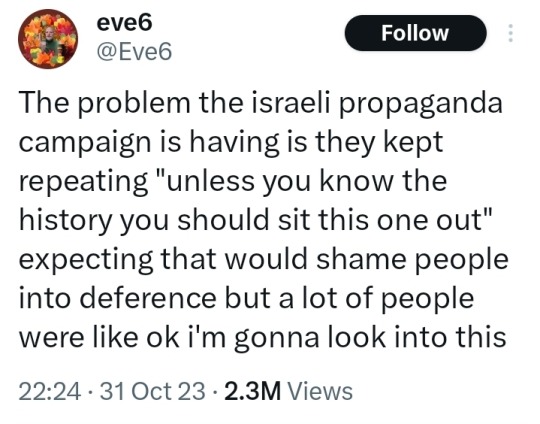
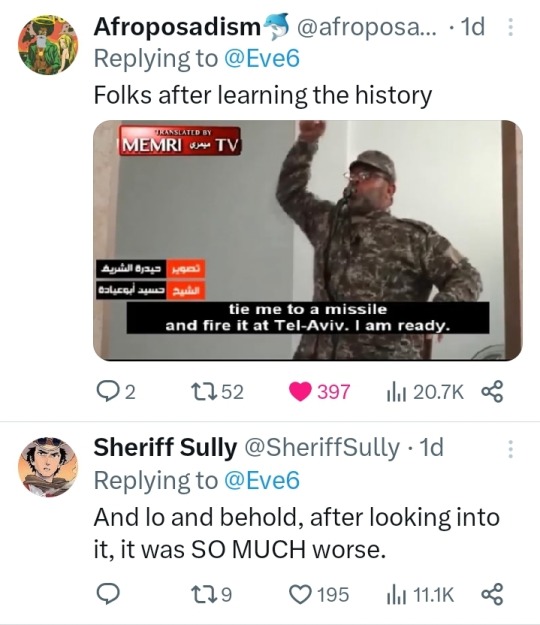

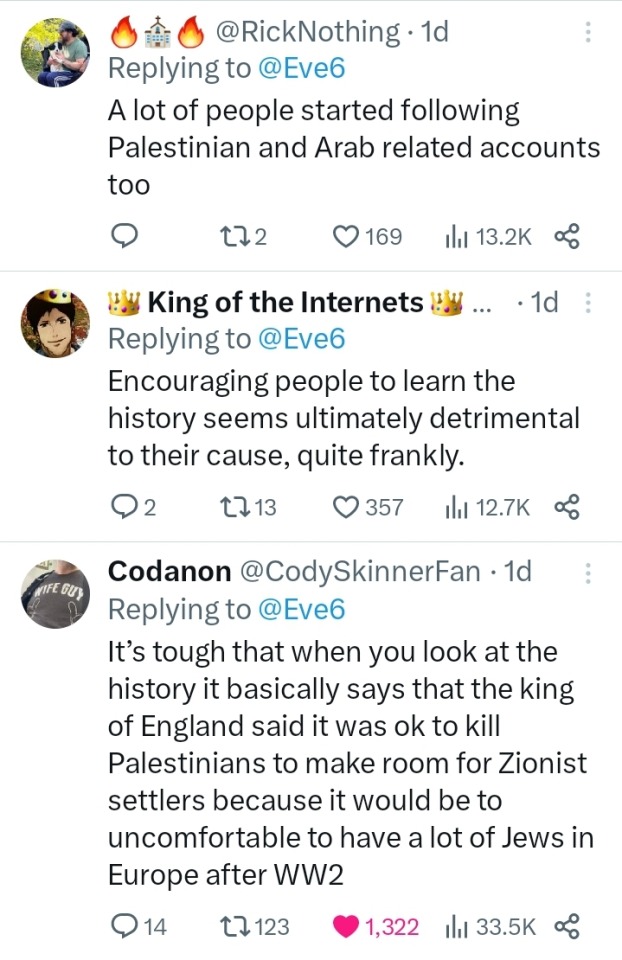
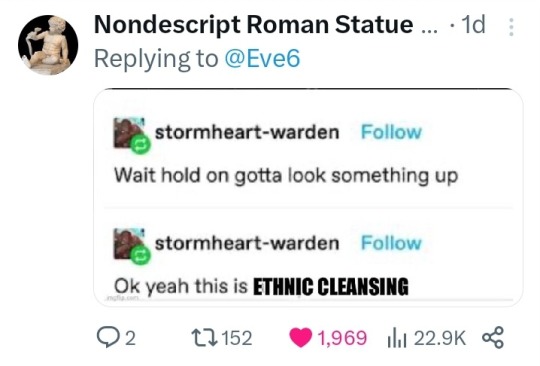
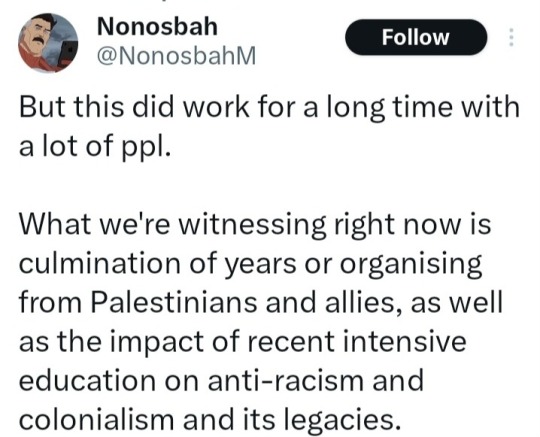
The Big Damn List Of Stuff They Said You Didn't Know
(Yes, it's a lot. Just choose your preferred medium and then pick one.)
Podcasts
Backgrounders and Quick Facts
Interactive Maps
Teach-Out Resources
Reading Material (free)
Films and Documentaries (free)
Non-Governmental Organizations
Social Media
How You Can Help <- URGENT!!!
Podcasts
Cocktails & Capitalism: The Story of Palestine Part 1, Part 3
It Could Happen Here: The Cheapest Land is Bought with Blood, Part 2, The Balfour Declaration
Citations Needed: Media narratives and consent manufacturing around Israel-Palestine and the Gaza Siege
The Deprogram: Free Palestine, ft. decolonizatepalestine.com.
Backgrounders and Quick Facts
The Palestine Academy: Palestine 101
Institute for Middle East Understanding: Explainers and Quick Facts
Interactive Maps
Visualizing Palestine
Teach-Out Resources
1) Cambridge UCU and Pal Society
Palestine 101
Intro to Palestine Film + Art + Literature
Resources for Organising and Facilitating)
2) The Jadaliya YouTube Channel of the Arab Studies Institute
Gaza in Context Teach-in series
War on Palestine podcast
Updates and Discussions of news with co-editors Noura Erakat and Mouin Rabbani.
3) The Palestine Directory
History (virtual tours, digital archives, The Palestine Oral History Project, Documenting Palestine, Queering Palestine)
Cultural History (Palestine Open Maps, Overdue Books Zine, Palestine Poster Project)
Contemporary Voices in the Arts
Get Involved: NGOs and campaigns to help and support.
3) PalQuest Interactive Encyclopedia of the Palestine Question.
4) The Palestine Remix by Al Jazeera
Books and Articles
Free reading material
My Gdrive of Palestine/Decolonization Literature (nearly all the books recommended below + books from other recommended lists)
Five free eBooks by Verso
Three Free eBooks on Palestine by Haymarket
LGBT Activist Scott Long's Google Drive of Palestine Freedom Struggle Resources
Recommended Reading List
Academic Books
Edward Said (1979) The Question of Palestine, Random House
Ilan Pappé (2002)(ed) The Israel/Palestine Question, Routledge
Ilan Pappé (2006) The Ethnic Cleansing of Palestine, OneWorld Publications
Ilan Pappé (2011) The Forgotten Palestinians: A History of the Palestinians in Israel, Yale University Press
Ilan Pappé (2015) The Idea of Israel: A History of Power and Knowledge, Verso Books
Ilan Pappé (2017) The Biggest Prison On Earth: A History Of The Occupied Territories, OneWorld Publications
Ilan Pappé (2022) A History of Modern Palestine, Cambridge University Press
Rosemary Sayigh (2007) The Palestinians: From Peasants to Revolutionaries, Bloomsbury
Andrew Ross (2019) Stone Men: the Palestinians who Built Israel, Verso Books
Rashid Khalidi (2020) The Hundred Years’ War on Palestine: A History of Settler Colonialism and Resistance 1917–2017
Ariella Azoulay (2011) From Palestine to Israel: A Photographic Record of Destruction and State Formation, 1947-1950, Pluto Press
Ariella Azoulay and Adi Ophir (2012) The One-State Condition: Occupation and Democracy in Israel/Palestine, Stanford University Press.
Jeff Halper (2010) An Israeli in Palestine: Resisting Dispossession, Redeeming Israel, Pluto Press
Jeff Halper (2015) War Against the People: Israel, the Palestinians and Global Pacification
Jeff Halper (2021) Decolonizing Israel, Liberating Palestine: Zionism, Settler Colonialism, and the Case for One Democratic State, Pluto Press
Anthony Loewenstein (2023) The Palestine Laboratory: How Israel exports the Technology of Occupation around the World
Noura Erakat (2019) Justice for Some: Law and the Question of Palestine, Stanford University Press
Neve Gordon (2008) Israel’s Occupation, University of California Press
Joseph Massad (2006) The Persistence of the Palestinian Question: Essays on Zionism and the Palestinians, Routledge
Memoirs
Edward Said (1986) After the Last Sky: Palestine Lives, Columbia University PEdward Saidress
Edward Said (2000) Out of Place; A Memoir, First Vintage Books
Mourid Barghouti (2005) I saw Ramallah, Bloomsbury
Hatim Kanaaneh (2008) A Doctor in Galilee: The Life and Struggle of a Palestinian in Israel, Pluto Press
Raja Shehadeh (2008) Palestinian Walks: Into a Vanishing Landscape, Profile Books
Ghada Karmi (2009) In Search of Fatima: A Palestinian Story, Verso Books
Vittorio Arrigoni (2010) Gaza Stay Human, Kube Publishing
Ramzy Baroud (2010) My Father Was a Freedom Fighter: Gaza's Untold Story, Pluto Press
Izzeldin Abuelaish (2011) I Shall Not Hate: A Gaza Doctor’s Journey on the Road to Peace and Human Dignity, Bloomsbury
Atef Abu Saif (2015) The Drone Eats with Me: A Gaza Diary, Beacon Press
Anthologies
Voices from Gaza - Insaniyyat (The Society of Palestinian Anthropologists)
Letters From Gaza • Protean Magazine
Salma Khadra Jayyusi (1992) Anthology of Modern Palestinian Literature, Columbia University Press
ASHTAR Theatre (2010) The Gaza Monologues
Refaat Alreer (ed) (2014) Gaza Writes Back, Just World Books
Refaat Alreer, Laila El-Haddad (eds) (2015) Gaza Unsilenced, Just World Books
Cate Malek and Mateo Hoke (eds)(2015) Palestine Speaks: Narrative of Life under Occupation, Verso Books
Jehad Abusalim, Jennifer Bing (eds) (2022) Light in Gaza: Writings Born of Fire, Haymarket Books
Short Story Collections
Ghassan Kanafani, Hilary Kilpatrick (trans) (1968) Men in the Sun and Other Palestinian Stories, Lynne Rienner Publishers
Ghassan Kanafani, Barbara Harlow, Karen E. Riley (trans) (2000) Palestine’s Children: Returning to Haifa and Other Stories, Lynne Rienner Publishers
Atef Abu Saif (2014) The Book of Gaza: A City in Short Fiction, Comma Press
Samira Azzam, Ranya Abdelrahman (trans) (2022) Out Of Time: The Collected Short Stories of Samira Azzam
Sonia Sulaiman (2023) Muneera and the Moon; Stories Inspired by Palestinian Folklore
Essay Collections
Edward W. Said (2000) Reflections on Exile and Other Essays, Harvard University Press
Salim Tamari (2008) Mountain against the Sea: Essays on Palestinian Society and Culture, University of California Press
Fatma Kassem (2011) Palestinian Women: Narratives, histories and gendered memory, Bloombsbury
Ramzy Baroud (2019) These Chains Will Be Broken: Palestinian Stories of Struggle and Defiance in Israeli Prisons, Clarity Press
Novels
Sahar Khalifeh (1976) Wild Thorns, Saqi Books
Liyana Badr (1993) A Balcony over the Fakihani, Interlink Books
Hala Alyan (2017) Salt Houses, Harper Books
Susan Abulhawa (2011) Mornings in Jenin, Bloomsbury
Susan Abulhawa (2020) Against the Loveless World, Bloomsbury
Graphic novels
Joe Sacco (2001) Palestine
Joe Sacco (2010) Footnotes in Gaza
Naji al-Ali (2009) A Child in Palestine, Verso Books
Mohammad Sabaaneh (2021) Power Born of Dreams: My Story is Palestine, Street Noise Book*
Poetry
Fady Joudah (2008) The Earth in the Attic, Sheridan Books,
Ghassan Zaqtan, Fady Joudah (trans) (2012) Like a Straw Bird It Follows Me and Other Poems, Yale University Press
Hala Alyan (2013) Atrium: Poems, Three Rooms Press*
Mohammed El-Kurd (2021) Rifqa, Haymarket Books
Mosab Abu Toha (2022) Things You May Find Hidden in My Ear: Poems from Gaza, City Lights Publishers
Tawfiq Zayyad (2023) We Are Here to Stay, Smokestack Books*
The Works of Mahmoud Darwish
Poems
Rafeef Ziadah (2011) We Teach Life, Sir
Nasser Rabah (2022) In the Endless War
Refaat Alareer (2011) If I Must Die
Hiba Abu Nada (2023) I Grant You Refuge/ Not Just Passing
[All books except the ones starred are available in my gdrive. I'm adding more each day. But please try and buy whatever you're able or borrow from the library. Most should be available in the discounted Free Palestine Reading List by Pluto Press, Verso and Haymarket Books.]
Human Rights Reports & Documents
Information on current International Court of Justice case on ‘Legal Consequences arising from the Policies and Practices of Israel in the Occupied Palestinian Territory, including East Jerusalem’
UN Commission of Inquiry Report 2022
UN Special Rapporteur Report on Apartheid 2022
Amnesty International Report on Apartheid 2022
Human Rights Watch Report on Apartheid 2021
Report of the United Nations Fact-Finding Mission on the Gaza Conflict’ 2009 (‘The Goldstone Report’)
Advisory Opinion on the Legal Consequences of the Construction of a Wall in the Occupied Palestinian Territory, International Court of Justice, 9 July 2004
Films
Documentaries
Jenin, Jenin (2003) dir. Mohammed Bakri
Massacre (2005) dir. Monica Borgmann, Lokman Slim, Hermann Theissen
Slingshot HipHop (2008) dir. Jackie Reem Salloum
Waltz with Bashir (2008) dir. Ari Folman † (also on Amazon Prime)
Tears of Gaza (2010) dir. Vibeke Løkkeberg (also on Amazon Prime)
5 Broken Cameras (2011) dir. Emad Burnat (also on Amazon Prime)
The Gatekeepers (2012) dir. Dror Moreh (also on Amazon Prime)
The Great Book Robbery (2012) | Al Jazeera English
Al Nakba (2013) | Al Jazeera (5-episode docu-series)
The Village Under the Forest (2013) dir. Mark J. Kaplan
Where Should The Birds Fly (2013) dir. Fida Qishta
Naila and the Uprising (2017) (also on Amazon Prime)
GAZA (2019) dir. Andrew McConnell and Garry Keane
Gaza Fights For Freedom (2019) dir. Abby Martin
Little Palestine: Diary Of A Siege (2021) dir. Abdallah Al Khatib
Palestine 1920: The Other Side of the Palestinian Story (2021) | Al Jazeera World Documentary
Gaza Fights Back (2021) | MintPress News Original Documentary | dir. Dan Cohen
Innocence (2022) dir. Guy Davidi
Short Films
Fatenah (2009) dir. Ahmad Habash
Gaza-London (2009) dir. Dina Hamdan
Condom Lead (2013) dir. Tarzan Nasser, Arab Nasser
OBAIDA (2019) | Defence for Children Palestine
Theatrical Films
Divine Intervention (2002) | dir. Elia Suleiman (also on Netflix)
Paradise Now (2005) dir Hany Abu-Assad (also on Amazon Prime)
Lemon Tree (2008) (choose auto translate for English subs) (also on Amazon Prime)
It Must Be Heaven (2009) | dir. Elia Suleiman †
The Promise (2010) mini-series dir. Peter Kosminsky (Part 1, Part 2, Part 3, Part 4)
Habibi (2011)* dir. Susan Youssef
Omar (2013)* dir. Hany Abu-Assad †
3000 Nights (2015)* dir. Mai Masri
Foxtrot (2017) dir. Samuel Maoz (also on Amazon Prime)
The Time that Remains (2019) dir. Elia Suleiman †
Gaza Mon Amour (2020) dir. Tarzan Nasser, Arab Nasser †
The Viewing Booth (2020) dir. Ra'anan Alexandrowicz (on Amazon Prime and Apple TV)
Farha (2021)* | dir. Darin J. Sallam
Palestine Film Institute Archive
All links are for free viewing. The ones marked with a star (*) can be found on Netflix, while the ones marked † can be downloaded for free from my Mega account.
If you find Guy Davidi's Innocence anywhere please let me know, I can't find it for streaming or download even to rent or buy.
In 2018, BDS urged Netflix to dump Fauda, a series created by former members of IOF death squads that legitimizes and promotes racist violence and war crimes, to no avail. Please warn others to not give this series any views. BDS has not called for a boycott of Netflix. ]
NGOs
The Boycott, Divestment, Sanctions (BDS) Movement
Euro-Mediterranean Human Rights Monitor
UNRWA
Palestine Defence for Children International
Palestinian Feminist Collective
Al-Shabaka: The Palestinian Policy Network
Addameer Prisoner Support and Human Rights Association
Institute for Palestine Studies
Al Haq
Artists for Palestine
The Palestine Museum
Jewish Currents
B’Tselem
DAWN
Social Media
Palestnians on Tumblr
@el-shab-hussein
@killyfromblame
@apollos-olives
@fairuzfan
@palipunk
@sar-soor
@nabulsi
@wearenotjustnumbers2
@90-ghost
@tamarrud
@northgazaupdates
Allies and advocates (not Palestinian)
@bloglikeanegyptian beautiful posts that read like op-eds
@vyorei daily news roundups
@luthienne resistance through prose
@decolonize-the-left scoop on the US political plans and impacts
@feluka
@anneemay
(Please don't expect any of these blogs to be completely devoted to Palestine allyship; they do post regularly about it but they're still personal blogs and post whatever else they feel like. Do not harrass them.)
Gaza journalists
Motaz Azaiza IG: @motaz_azaiza | Twitter: @azaizamotaz9 | TikTok: _motaz.azaiza (left Gaza as of Jan 23)
Bisan Owda IG and TikTok: wizard_bisan1 | Twitter: @wizardbisan
Saleh Aljafarawi IG: @saleh_aljafarawi | Twitter: @S_Aljafarawi | TikTok: @saleh_aljafarawi97
Plestia Alaqad IG: @byplestia | TikTok: @plestiaaqad (left Gaza)
Wael Al-Dahdouh IG: @wael_eldahdouh | Twitter: @WaelDahdouh (left Gaza as of Jan 13)
Hind Khoudary IG: @hindkhoudary | Twitter: @Hind_Gaza
Ismail Jood IG and TikTok: @ismail.jood (announced end of coverage on Jan 25)
Yara Eid IG: @eid_yara | Twitter: @yaraeid_
Eye on Palestine IG: @eye.on.palestine | Twitter: @EyeonPalestine | TikTok: @eyes.on.palestine
Muhammad Shehada Twitter: @muhammadshehad2
(Edit: even though some journos have evacuated, the footage up to the end of their reporting is up on their social media, and they're also doing urgent fundraisers to get their families and friends to safety. Please donate or share their posts.)
News organisations
The Electronic Intifada Twitter: @intifada | IG: @electronicintifada
Quds News Network Twitter and Telegram: @QudsNen | IG: @qudsn (Arabic)
Times of Gaza IG: @timesofgaza | Twitter: @Timesofgaza | Telegram: @TIMESOFGAZA
The Palestine Chronicle Twitter: @PalestineChron | IG: @palestinechron | @palestinechronicle
Al-Jazeera Twitter: @AJEnglish | IG and TikTok: @aljazeeraenglish, @ajplus
Middle East Eye IG and TikTok: @middleeasteye | Twitter: @MiddleEastEye
Democracy Now Twitter and IG: @democracynow TikTok: @democracynow.org
Mondoweiss IG and TikTok: @mondoweiss | Twitter: @Mondoweiss
The Intercept Twitter and IG: @theintercept
MintPress Twitter: @MintPressNews | IG: mintpress
Novara Media Twitter and IG: @novaramedia
Truthout Twitter and IG: @truthout
Palestnians on Other Social Media
Mouin Rabbani: Middle East analyst specializing in the Arab-Israeli conflict and Palestinian affairs. Twitter: @MouinRabbani
Noura Erakat: Legal scholar, human rights attorney, specialising in Israeli–Palestinian conflict. Twitter: @4noura | IG: @nouraerakat | (http://www.nouraerakat.com/)
Hebh Jamal: Journalist in Germany. IG and Twitter: @hebh_jamal
Ghada Sasa: PhD candidate in International Relations, green colonialism, and Islam in Canada. Twitter: @sasa_ghada | IG: @ghadasasa48
Taleed El Sabawi: Assistant professor of law and researcher in public health. Twitter: @el_sabawi | IG
Lexi Alexander: Filmmaker and activist. Twitter: @LexiAlex | IG: @lexialexander1
Mariam Barghouti: Writer, blogger, researcher, and journalist. Twitter: @MariamBarghouti | IG: @mariambarghouti
Rasha Abdulhadi: Queer poet, author and cultural organizer. Twitter: @rashaabdulhadi
Mohammed el-Kurd: Writer and activist from Jerusalem. IG: @mohammedelkurd | Twitter: @m7mdkurd
Ramy Abdu: Founder and Chairman of the Euro-Mediterranean Human Rights Monitor. Twitter: @RamyAbdu
Subhi: Founder of The Palestine Academy website. IG: @sbeih.jpg |TikTok @iamsbeih | Twitter: @iamsbeih
Allies
Lowkey (Kareem Dennis): Rapper, activist, video and podcast host for MintPress. Twitter: @LowkeyOnline IG: @lowkeyonline
Francesca Albanese: UN Special Rapporteur on the Occupied Territories. Twitter: @FranceskAlbs
Sana Saeed: Journalist and media critic, host and senior producer at Al-Jazeera Plus. IG: @sanaface | Twitter: @SanaSaeed
Shailja Patel: Poet, playwright, activist, founding member of Kenyans For Peace, Truth and Justice. Twitter: @shailjapatel
Jairo I. Fúnez-Flores: Researcher in curriculum studies, decolonial theory, social movements. Twitter: @Jairo_I_Funez
Jack Dodson: Journalist and Filmmaker. Twitter: @JackDodson IG: @jdodson4
Imani Barbarin: Writer, public speaker, and disability rights activist. IG: @crutches_and_spice | Twitter: @Imani_Barbarin | TikTok: @crutches_and_spice
Jewish Allies
Katie Halper: US comedian, writer, filmmaker, podcaster, and political commentator. IG and Twitter: @kthalps
Dr. Chanda Prescod-Weinstein: Associate Professor of Physics and Core Faculty Member in Women’s and Gender Studies at the University of New Hampshire. Twitter: @IBJIYONGI | (https://chanda.science/)
Amanda Gelender: Writer. Twitter: @agelender | (https://agelender.medium.com/)
Yoav Litvin: Jerusalem-born Writer and Photographer. IG and Twitter: @nookyelur | (yoavlitvin.com)
Alana Lentin: Professor of Cultural and Social Analysis at Western Sydney University. Twitter: @alanalentin
Gideon Levy: anti-Zionist Israeli journalist and activist. Twitter: @gideonlevy
‼️How You Can Help Palestine‼️
Click for Palestine (Please reblog!!)
Masterlist of donation links by @sulfurcosmos (Please reblog!!)
Water for Gaza: Donate directly to the Gaza Municipality
Operation Olive Branch Linktree for vetted fundraisers, donations and political action resources. TikTok and Instagram: @operationolivebranch | Twitter: @OPOliveBranch
Gazafunds (vetted and spotlighted GFMs)
The Butterfly Effect Project (spreadsheet of vetted GFMs)
Spreadsheet of Gaza fundraisers vetted by @el-shab-hussein and @nabulsi
If any links are broken let me know. Or pull up the current post to check whether it's fixed.
Political action to pressure the Harris campaign to stop arming Israel (for US citizens): Uncommitted Movement (TikTok: @uncommittedmvmt) (Please reblog!!)
"Knowledge is Israel's worst enemy. Awareness is Israel's most hated and feared foe. That's why Israel bombs a university: it wants to kill openness and determination to refuse living under injustice and racism."
— Dr. Refaat Alareer, (martyred Dec 6, 2023)
From River To The Sea Palestine Will Be Free 🇵🇸🇵🇸🇵🇸
-----
Edit 1: took the first video down because turns out the animator is a terf and it links to her blog. Really sorry for any distress.
Edit 2: All recommended readings + Haymarket recommendations + essential decolonization texts have been uploaded to my linked gdrive. I will adding more periodically. Please do buy or check them out from the library if possible, but this post was made for and by poor and gatekept Global South bitches like me.
Some have complained about the memes being disrespectful. You're actually legally obligated to make fun of Israeli propaganda and Zionists. I don't make the rules.
Edit 3: "The river to the sea" does not mean the expulsion of Jews from Palestine. Believing that is genocide apologia.
Edit 4: Gazans have specifically asked us to put every effort into pushing for a ceasefire instead of donations. "Raising humanitarian aid" is a grift Western governments are pushing right now to deflect from the fact that they're sending billions to Israel to keep carpet bombing Gazans. As long as the blockades are still in place there will never be enough aid for two million people. (UPDATE: PLEASE DONATE to the Gazan's GoFundMe fundraisers to help them buy food and get out of Rafah into Egypt. E-SIMs, food and medical supplies are also essential. Please donate to the orgs linked in the How You Can Help. Go on the strikes. DO NOT STOP PROTESTING.)
Edit 5: Google drive link for academic books folder has been fixed. Also have added a ton of resources to all the other folders so please check them out.
Edit 6: Added interactive maps, Jadaliya channel, and masterlists of donation links and protest support and of factsheets.
The twitter accounts I reposted as it was given to me and I just now realized it had too many Israeli voices and almost none of the Palestinians I'm following, so it's being edited. (Update: done!) also removed sources like Jewish Voices of Peace and Breaking the Silence that do good work but have come under fair criticism from Palestinians.
Edit 7: Complete reformatting
Edit 8: Complete revamping of the social media section. It now reflects my own following list.
Edit 9: removed some more problematic people from the allies list. Remember that the 2SS is a grift that's used to normalize violence and occupation, kids. Supporting the one-state solution is lowest possible bar for allyship. It's "Free Palestine" not "Free half of Palestine and hope Israel doesn't go right back to killing them".
Edit 10: added The Palestine Directory + Al Jazeera documentary + Addameer. This "100 links per post" thing sucks.
Edit 11: more documentaries and films
Edit 12: reformatted reading list
Edit 13: had to remove @palipunk's masterlist to add another podcast. It's their pinned post and has more resources Palestinian culture and crafts if you want to check it out
Edit 14 6th May '24: I've stopped updating this masterlist so some things, like journalists still left in Gaza and how to support the student protests are missing. I've had to take a step back and am no longer able to track these things down on my own, and I've hit the '100 links per post' limit, but if you can leave suggestions for updates along with links in either the replies or my asks I will try and add them.
Edit 15 10th August: added to Palestinian allies list and reworked the Help for Palestine section. There's been a racist harrassment campaign against the Palestinian Tumblrs that vetted the Gaza fundraisers based off one mistake made by a Gazan who doesn't understand English. If you're an ally, shut that shit down. Even if you donate to a scam GFM, you're only out some coffee money; if everyone stops donating to all the GFMs in fear of scams, those families die.
#free palestine#palestine resources#palestine reading list#decolonization#israel palestine conflict#israel palestine war#british empire#american imperialism#apartheid#social justice#middle east history#MENA#arab history#anti zionism#palestinian art#palestinian history#palestinian culture#palestinian genocide#al nakba#ethnic cleansing#war crimes#racism#imperialism#colonialism#british colonialism#knee of huss#ask to tag#Youtube
82K notes
·
View notes
Text
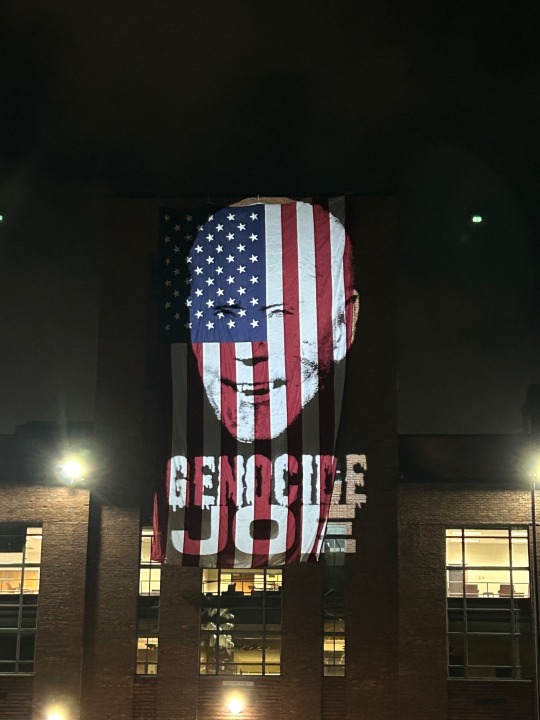
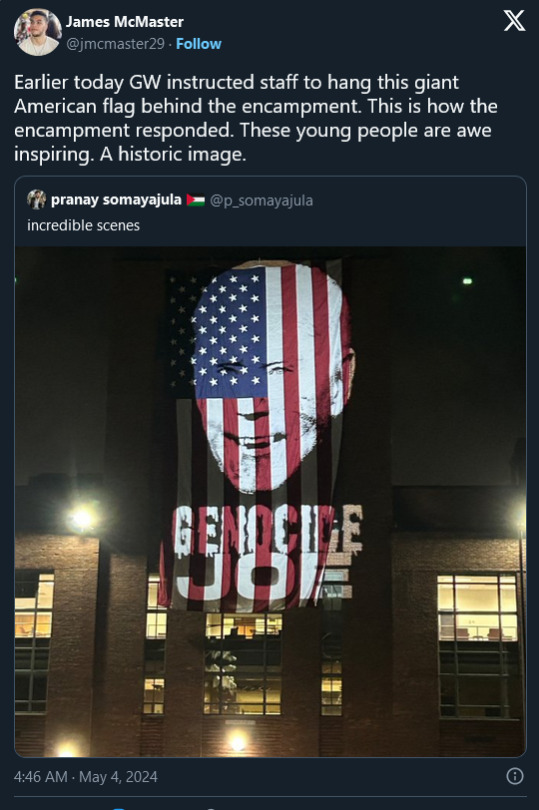
#genocide joe#free palestine#palestine#propaganda#biden#student protest#students#2024#american flag#joe biden#democrats#george washington university#washington dc#usa
28K notes
·
View notes
Text
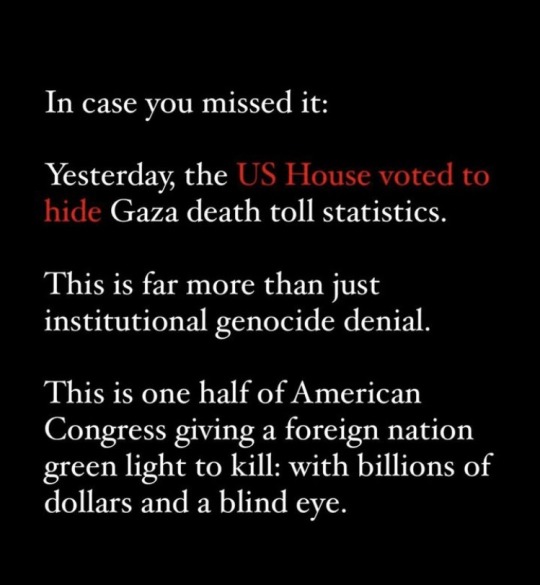
This measure, if passed in Senate, would make it illegal for the US State Department to cite genocide statistics.
In other words, illegal to do its job.
#social justice#current events#human rights#free palestine#gaza#free gaza#palestine#gaza strip#gaza genocide#gazaunderattack#save gaza#gazaunderfire#stand with gaza#from the river to the sea palestine will be free#free palastine#freepalastine🇵🇸#important#us politics#american politics#united states politics#usa politics#palestine 🇵🇸#news on gaza#palestine news
19K notes
·
View notes
Text
source
On Friday, a group of protestors walked on Highway 89 in Cameron, Ariz., protesting Pinyon Plain Mine owner Energy Fuels trucking uranium ore through the Navajo Nation to Utah.
Uranium has a long history of impacts on the Navajo Nation and its people since the 1940s.
"We've seen the effects of these things in the past on our land, the spills into our rivers, into our communities, the residual effects on our on our health, of our children, our elders," Cameron resident Adair Klopfenstein said. "It's awful, and we don't want it to happen again."
The Pinyon Plain Mine, formerly known as Canyon Mine, began mining uranium ore in December and is expected to be actively mining for at least five years. The company had told 12News at the end of June it would start transporting the uranium ore to a mill in southeast Utah in July or August.
That hauling appears to have started before the pause was put in place.
"I call it illegal smuggling across our border and then through the Navajo Nation," Navajo Nation President Buu Nygren said.
And from June:
#Diné#Navajo#Navajo nation#news#human rights#u.s politics#american politics#current events#ndn#indigenous#Diné resistance#U.S Imperialism#Imperialism#solidarity#intersectional#systemic racism#treaty violation#call to action#indigenous ally#native ally#ally#allyship#kamala harris#joe biden#Harris 2024#genocide joe#vote
21K notes
·
View notes
Text
On August 14, 1908, a mob of white citizens gathered at the local jail in Springfield, Illinois, intent on lynching two Black men named George Richardson and Joe James. When the would-be lynch mob learned that the men had been taken from the jail to another city, a violent riot broke out.
Some members of the mob destroyed the business of Henry Loper, a man rumored to have helped transport Mr. Richardson and Mr. James from the jail. Others, convinced the men were still in the jail, attacked police and militia stationed at the facility. The two mob groups then rejoined and descended on homes and businesses in Springfield’s Black neighborhoods, stealing close to $150,000 worth of property and setting fire to whole blocks.
The violence climaxed early the next morning with the lynching of two Black men. After Scott Burton tried to defend himself against the attackers, he was shot four times, dragged through the streets, then hanged and mutilated until the militia interceded. William Donegan, an 84-year-old Black man married to a white woman, was taken from his home and hanged from a tree across the street, where his assailants cut his throat and stabbed him. Mr. Donegan was still alive when the militia arrived at the scene but died the next morning.
Amidst the terror of the riot, which left an estimated seven people dead, hundreds of Black citizens sought National Guard protection at nearby Camp Lincoln. Others fled the city. Police arrested 150 people suspected of participating in the violence, and 117 were indicted. Of the three individuals indicted for murder, one committed suicide and two were acquitted.

#history#white history#us history#am yisrael chai#jumblr#republicans#black history#democrats#August 14 1908#August 14#Springfield#Illinois#lynch#lynching#George Richardson#Joe James#american apartheid#apartheid#israel is an apartheid state#end the apartheid#israeli apartheid#anti apartheid#anti zionisim#settler colonialism#israel war crimes#genocide#american genocide#america is an apartheid state
0 notes
Text
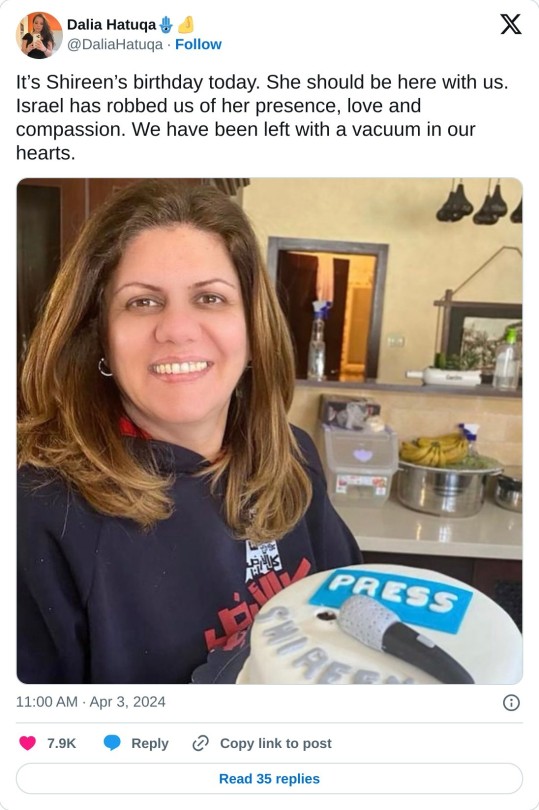
This is the last birthday photo taken of Shireen before she was assassinated by the IOF nearly a month later:
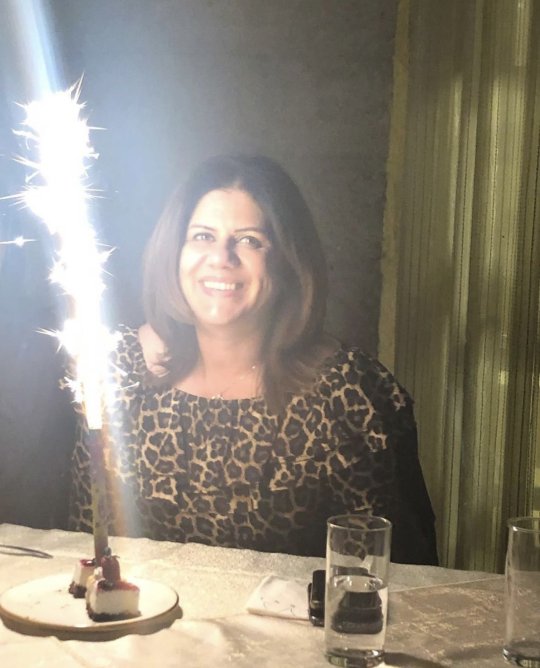
Happy Birthday to an incredible woman who should still be here. You will always be remembered and forever missed.
#feminist#social justice#free palestine#palestine#free gaza#settler violence#settler colonialism#israel is a terrorist state#israel is committing genocide#israel is evil#end the occupation#shireen abu akleh#palestinian americans#palestinian journalists#journalists#protect journalists#gaza strip#gaza#gaza genocide
16K notes
·
View notes
Text
Here’s every ceasefire deal and hostage exchange Hamas has offered Israel since October 7th, 2023, courtesy of BreakThrough News.
#israeli genocide#free palestine#palestine#palestinian hostages#israeli hostages#hostage exchange#ceasefire#Hamas#IDF#benjamin netanyahu#fuck netanyahu#breakthrough news#American genocide#USA genocide#Biden#Joe Biden#anti imperialism#gaza#israel#rafah#tel aviv#jerusalem
2K notes
·
View notes
Text
I really feel like you guys should stop waiting for a "revolution" and actually try and improve the country.
"I hate the united states and I wish it didn't exist!"
I do too! But, I also understand that the "revolution" isn't going to happen any time soon and waiting for it is just being a bit too hopeful.
Even if there was a "revolution" or a "civil war" I doubt you'd actually want that to happen. Let's for one moment, imagine what a theoretical collapse of the united states would look like.
First problem: it would be a multi-sided mess.
If the united states truly had a civil war or a collapse, you wouldn't have 2 sided to this "civil war" or "revolution" it WOULD however be a collection of states that are declaring independence within short periods of time between each other.
I could imagine the most wealthy or militarized states to declare independence first, while the states with the least resources or power staying until the bitter end.
Maybe we could see the less powerful states join together after the united states is completely collapsed.
Second problem: there would be a TON of foreign influence.
imagine if you will, a powerful foreign power such as China, Influencing the smaller states.
I personally don't feel like that the more "leftist" states would be more open to Chinese and foreign influence in general. I DO believe however that a state that has little power and/or resources would be open to foreign influence.
Not only that but, the western powers internationally would most likely support the states that are the closest to the original American ideals or simply just the ones that are willing to cooperate with the west.
Third problem: there would be a significant change in power internationally.
An American collapse would leave every country that has ever been America's enemy free to do whatever they want. A lot of wars in the world would start, especially in places where the American military prevented those old enemies from doing whatever they wanted.
The former allies of the united states would be sent into a panic after the united states collapses, unstable countries that needed American support to function would be thrown into civil war.
Major foreign powers such as China would do everything they can to gain and secure their newfound power. They would also make sure that every resource and ally that was left by the united states would be taken.
In conclusion, though I dislike American ideals and much of it's geopolitical policy. I do believe that a "Revolution" would be a worse scenario.
#geopolitics#politics#history#China#America#american politics#american genocide#American geopolitics#Europe#international community#technology#writing#alternate timeline#alternate universe
1 note
·
View note
Text
Out of Sight, Out of Mind: Kinds of Evil in The Patriot
My least controversial take on The Patriot, at least on Tumblr, is that Colonel Tavington is the best thing about the film. But what I find most interesting about Tavingtont is revealed by his juxtaposition with Benjamin Martin. This is why I do not share the view held by many that Tavington is the only good thing about the film. As I've argued elsewhere, I think it would be possible to make a very watchable film focused on Martin's internal conflict . . . if he actually had one. The Martin we do have, though, is interesting because despite Tavington obviously being a villain, and an excellent one at that, Martin's characterization is even more evil. I don't mean that his actions in the film are worse or even that his past actions are necessarily worse than Tavington's present ones. Rather, the role of Martin's actions in the tension between fiction and history that permeates the film is evil. This discussion of evil is heavily indebted to Simone Weil's famous line: "Imaginary evil is romantic and varied; real evil is gloomy, monotonous, barren, boring" (Gravity and Grace, 1947) As concerns The Patriot, I would say fictional evil is spectacular; historical evil is mundane.
One of the most memorable moments in the film is the Green Dragoons burning Pembroke Church with its congregation locked inside. From Jason Isaacs' gleefully sinister performance as he addresses the congregation from the nave on the back of his horse to the women trapped inside crying and screaming to the flames rising against the backdrop of the dusky sky, it is a feat of theatricality. Director Roland Emmerich had the church frame rebuilt after burning it down during the first day of shooting this scene to bet better lighting, and it is stunning. It is also a complete historical fabrication, which numerous historians have pointed out. While British officers in the South Carolina campaign were notorious for their destruction of private property, there is no record of any British officer burning civilians in a church there or in any other colony. What I think a lot of people overlook, though, is that the implausibility of this action is actually referenced in this scene.
When Tavington orders Captain Wilkins to burn the church, Wilkins' response is stunned silence during which his eyes scan Tavington's face for signs that he does not mean what he says. Then he tries to argue with him: "There's no honor is this." That Wilkins knows some of the people in the church may account in part for this hesitation, but he has been serving under Tavington since before the militia was formed, and he does not seem apprehensive when he tells the civilians they have been "requested" to gather in the church. We know the Green Dragoons have burned eight militiamen's homes, killing any who resisted, but John Billings' wife and child are shot outside their house, the boy with the wooden pistol his father had given him inches from his hand (I always wonder what the Patriotic Americans who defend cops for shooting Black boys who turn out to have been armed only with cell phones make of this scene). It's possible Wilkins thought the townspeople would be safe in the church because it would prevent them from offering similar resistance. Whatever the reasons for Wilkins' hesitation, "Burn the church" is the only order Tavington ever has to repeat. Later, he assures Wilkins that "The honor is found in the ends, not the means. This'll be forgotten." Chilling words, but he is not angry that Wilkins did not obey him right away. Even he understands that this order is a significant departure from those he's given before.
Now, let's compare this scene to an earlier and much less dramatic one. While Martin is recruiting at a tavern, one of his potential militiamen, a man he clearly already knows from prior experience, asks a question: "Any bounty?" The statement is so vague the audience would not know what he is referring to were it not for Martin's reply: "No scalp bounty this time, Rollins, but I'll pay for the gear of any British soldiers you kill." The exchange is so casual you could almost miss that they are talking about trafficking in human remains. There is no sense of horror, shame, or regret on the part of either; this practice is simply part of their shared experience. No one can describe the plot of the film without mentioning the burning of Pembroke Church, but I have never seen anyone address these lines. This scene may be unimportant to the story, but I would argue it is very important to the kind of man Martin is. He did not engage in this practice once to the shock of his men; they engaged in it together often enough that it holds no more significance to them than trading rabbit pelts.
This dehumanization of Martin's enemies is also on display in his Fort Wilderness confession, and again it is glossed over by the narrative. Martin gives Gabriel a laundry list of the things he and his men did to the French and Cherokees they captured, but it took numerous viewings for me to realize how differently they treated the two groups. The French fort received a pallet of heads along with two survivors to tell the tale; the Cherokee settlement received baskets of eyes, tongues, and fingers. Both are gruesome offerings from any perspective, but it is easier to identify an acquaintance by their head, by their face that is always visible, than by a single eye or finger or a tongue. The Cherokees--including women and children, on whose behalf we are invited to be so shocked and sickened when they are White--would have faced the torture of uncertainty on top of so much evidence of torture done to others. If they cannot recognize whose parts they have, they cannot recognize whose are missing either. Shoot that scene for your film, Roland, and then tell us how bad Ben Martin feels about it after the fact.
Of course, what is most horrifying about Martin's treatment of his enemies is that it is based on historical fact. There was no fortress called Fort Wilderness in South Carolina during the French and Indian War, and there is no record as far as I'm aware of Francis Marion--or Nathaniel Greene or other figures on whom Martin is based--sending baskets of body parts to the Cherokees. However, there is ample evidence that Patriot forces carried out what we would today call a genocide against Cherokee people during the American Revolution: killing civilians, destroying crops and towns, and selling survivors into slavery. We do not see any of this in The Patriot, but the sparse details we do get in Martin and his peers' accounts of their past is enough to evoke it. Whether a given genocide happens in America, Poland, or Rwanda, dehumanization is one of the first steps.
There is a considerable amount of historical leniency in the portrayals of both Banastre Tarleton and Francis Marion in this movie. Marion did create problems for Cornwallis's army, and Tarleton's American Legion was unable to stop him. From there, though, the portrayals develop in wildly different ways. If anything about Tavington is less historically accurate than the church burning, it is how much he is despised by his fellow Redcoats owing to his actions. As I've said before, this has the unintended effect of making the British seem more ethical than the Americans, and this is doubly recognizable when the film has to invent atrocities to make Tavington sufficiently evil compared to Martin. Still, the church burning is one of my favorite scenes, the climax of Tavington's theatre queen arc. I could end the film there and be nearly completely satisfied, and sometimes I have. Nothing about Martin's evil offers this kind of spectacle, barring the scene in the woods where he takes a literal blood-bath, and that is what is so chilling about it. It's not just that Martin and his brothers in arms see genocide as being no big deal; the narrative encourages the audience to think of it that way, if indeed the audience thinks of it at all. What's important, surely, is that Colonial Americans overcame the evils of imperialism, not that they enthusiastically engaged in those evils themselves.
#the patriot#william tavington#jason isaacs#banastre tarleton#benjamin martin#mel gibson#frances marion#american genocide#simone weil
9 notes
·
View notes
Text
Here is the secret. Full license to our oppressors, and every avenue of justice closed to us. Yes, this is the bitter cup prepared for us by a republican and religious government—we shall drink it to the very dregs.
Elias Boudinot, The Phoenix (May 29, 1830)
0 notes